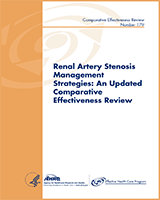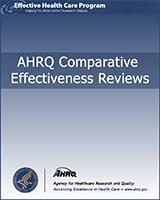Excerpt
This report summarizes the evidence evaluating the effect and safety of angioplasty with stent placements and medical therapies in the treatment of atherosclerotic renal artery stenosis (ARAS), particularly after long-term followup. The key questions and principal definition of terms were determined with the assistance of a technical expert panel.
Key questions addressed in this report are: 1. For patients with atherosclerotic renal artery stenosis in the modern management era (i.e., since JNC-5 in 1993a), what is the evidence on the effects of aggressive medical therapy (i.e., antihypertensive, antiplatelet, and antilipid treatment) compared to renal artery angioplasty with stent placement on long-term clinical outcomes (at least 6 months), including blood pressure control, preservation of kidney function, flash pulmonary edema, other cardiovascular events, and survival? 1a. What are the patient characteristics, including etiology, predominant clinical presentation, and severity of stenosis, in the studies? 1b. What adverse events and complications have been associated with aggressive medical therapy or renal artery angioplasty with stent placement? 2. What clinical, imaging, laboratory, and anatomic characteristics are associated with improved or worse outcomes when treating with either aggressive medical therapy alone or renal artery angioplasty with stent placement? 3. What treatment variables are associated with improved or worse outcomes of renal artery angioplasty with stent placement, including periprocedural medications, type of stent, use of distal protection devices, or other adjunct techniques?
Contents
Prepared for: Agency for Healthcare Research and Quality, U.S. Department of Health and Human Services.1 Contract No. 290-02-0022. Prepared by: Tufts-New England Medical Center EPC, Boston, Massachusetts.
Suggested citation:
Balk E, Raman G, Chung M, Ip S, Tatsioni A, Alonso A, Kupelnick B, Chew P, DeVine D, Gilbert S, Lau J. Comparative Effectiveness of Management Strategies for Renal Artery Stenosis. Comparative Effectiveness Review No. 5. (Prepared by Tufts-New England Medical Center Evidence-based Practice Center under Contract No. 290-02-0022). Rockville, MD: Agency for Healthcare Research and Quality. Available at www.effectivehealthcare.ahrq.gov/reports/final.cfm.
None of the investigators has any affiliations or financial involvement that conflicts with the material presented in this report.
This report is based on research conducted by the Tufts-New England Medical Center Evidence-based Practice Center (EPC) under contract to the Agency for Healthcare Research and Quality (AHRQ), Rockville, MD (Contract No. 290-02-0022). The findings and conclusions in this document are those of the authors, who are responsible for its contents; the findings and conclusions do not necessarily represent the views of AHRQ. Therefore, no statement in this article should be construed as an official position of the Agency for Healthcare Research and Quality or of the U.S. Department of Health and Human Services.
This report is intended as a reference and not as a substitute for clinical judgment. Anyone who makes decisions concerning the provision of clinical care should consider this report in the same way as any medical reference and in conjunction with all other pertinent information.
This report may be used, in whole or in part, as the basis for development of clinical practice guidelines and other quality enhancement tools, or as a basis for reimbursement and coverage policies. AHRQ or U.S. Department of Health and Human Services endorsement of such derivative products may not be stated or implied.
- 1
540 Gaither Road, Rockville, MD 20850. www
.ahrq.gov

